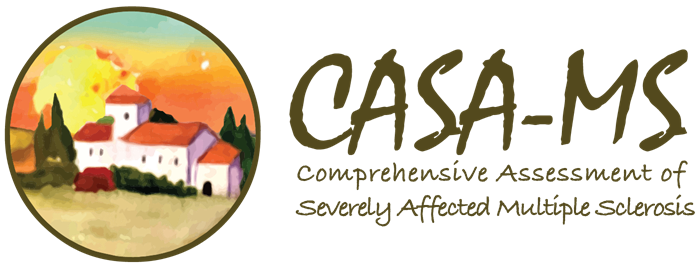
Innovative Multiple Sclerosis Research
asks why 10-15% of people with MS will eventully require 24-hour care?
WHY study people with the most severe MS progression?
We believe studying severely progressive MS will provide important clues to benefit everyone with MS.
WHY has comprehensive MS research of this population never been done?
Answer: logistics and costs. Most people with this level of progression are home-bound or in nursing homes, making them very difficult to find and assess. Even if they could be located and enrolled in studies, costs for imaging, blood sampling, cognitive and optical testing would be exceedingly high.
HOW did BNAC overcome the obstacles and conduct the first study?
A member of BNAC's Advisory Council connected Buffalo Neuroimaging with The Boston Home, a Dorchester, Massachusetts skilled-nursing facility specializing in residential care for people with MS. Together, we designed CASA-MS, a unique and comprehensive pilot study comparing progression of those with such severe MS symptoms that they require 24-hour care with people with MS of the same age, sex, and number of years with an MS diagnosis but with much less severe disease progression. BNAC's Advisory Council then removed the financial barrier by raising $500,000 to conduct the preliminary CASA-MS pilot study.
FINDINGS of CASA-MS Phase 1 Pilot Study
Abstract from the Journal of Neurology: Comprehensive Assessment of Severely Affected Multiple Sclerosis (CASA-MS)
At a presentation at The Boston Home on October 23, 2024, Robert Zivadinov, MD, PhD and principal investigator of the studies, provided a summary of three CASA-MS published papers. In attendance in-person and by Zoom were Boston Home study participants and other residents and staff, as well as members of the Buffalo Neuroimaging Analysis Center's Advisory Council, and the Press.
CASA-MS Boston Home Presentation 10/23/24
Key Finding and other outcomes
The CASA-MS study showed significantly more loss of gray matter in the brain among those with severe MS progression compared to those with less-severe progression. This means the loss of grey matter, not lesions in the white matter, is what vauses MS progression to the severe state.
New MS progression measurement tools were developed
Sara and Virginia, two women the same age, were both diagnosed with MS in 1999. Their lives are very different because of the severity of their symptoms. We want to know why. They met via Zoom after the first CASA-MS study was completed.
Video of CASA-MS "Research Twins", Sara and Virginia
WHAT'S next?
The University at Buffalo's Internal Review Board has approved a CASA-MS Phase 2 follow-up study of subjects with severe progression and control subjects with much milder progression. The study seeks to answer these questions:
- Does gray matter in the brain change over time?
- What does analysis of data from the low-resonance portable MRI show?
- What further research is needed for a Phase 3 clinical trial?
An important difference of this next study is that it will use the same scanner to capture 7T high-resolution images of all subjects. The resulting comparisons will have important implications for the study of severe MS progression.
How Can You Help?
The CASA-MS NEXT STEP Campaign seeks to raise $300,000 to take this next research step. More than ever before, research depends on private support from people like you.
We have already raised $271,000 (over 90%). $28,895 is still needed. If you would like to join us, please click "Make a Gift" below.
Questions about the research or how to make a gift? Click here
University at Buffalo Press Release.
